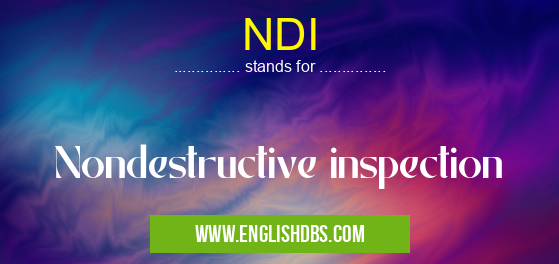What does NDI mean in RESEARCH
NDI (Nondestructive Inspection) is a wide range of analysis techniques used to evaluate the properties of a material, component, or system without causing damage. NDI plays a critical role in various industries, including manufacturing, construction, and aerospace, ensuring product quality, safety, and reliability.

NDI meaning in Research in Academic & Science
NDI mostly used in an acronym Research in Category Academic & Science that means Nondestructive inspection
Shorthand: NDI,
Full Form: Nondestructive inspection
For more information of "Nondestructive inspection", see the section below.
NDI Techniques
NDI encompasses a diverse array of techniques, each offering unique advantages depending on the material and application. Common NDI methods include:
- Ultrasonic Testing (UT): High-frequency sound waves are used to detect defects within a material.
- Radiographic Testing (RT): X-rays or gamma rays penetrate the material, revealing internal structures and defects.
- Eddy Current Testing (ET): Electromagnetic fields induce eddy currents in the material, providing information about surface defects and conductivity.
- Magnetic Particle Testing (MT): Magnetic particles are applied to a magnetized material, revealing surface cracks and discontinuities.
- Liquid Penetrant Testing (PT): A fluorescent or dye penetrant is applied to a material, seep into defects, and then removed, highlighting surface flaws.
Benefits of NDI
NDI offers numerous benefits, including:
- Early Detection of Defects: NDI techniques can identify defects at an early stage, preventing catastrophic failures and ensuring product reliability.
- Proactive Maintenance: Regular NDI inspections allow for proactive maintenance, reducing downtime and extending equipment life.
- Improved Safety: Accurate NDI evaluations enhance safety by detecting hidden defects that could pose risks to personnel.
- Cost Savings: Identifying and repairing defects early on can prevent costly repairs or replacements in the future.
- Compliance and Certification: NDI is often required for compliance with industry standards and regulations, ensuring product quality and traceability.
Essential Questions and Answers on Nondestructive inspection in "SCIENCE»RESEARCH"
What is Nondestructive Inspection (NDI)?
NDI is a set of techniques used to evaluate the integrity of materials, components, or structures without causing any damage. These techniques are used in various industries, including manufacturing, construction, and aerospace, to detect and assess defects, cracks, corrosion, or other anomalies.
What are the different methods of NDI?
NDI methods include:
- Visual Inspection: Examining the surface of a material or structure for visible defects.
What are the benefits of using NDI?
NDI offers several benefits, including:
- Early detection of defects: NDI techniques can identify problems before they become visible or cause failures.
Final Words: Nondestructive inspection (NDI) is an essential aspect of quality control and safety in various industries. By utilizing a range of techniques, NDI enables the evaluation of materials and components without causing damage. Early detection of defects, proactive maintenance, improved safety, cost savings, and compliance with regulations are just a few of the many benefits offered by NDI, making it a cornerstone of modern engineering practices.
NDI also stands for: |
|
| All stands for NDI |
